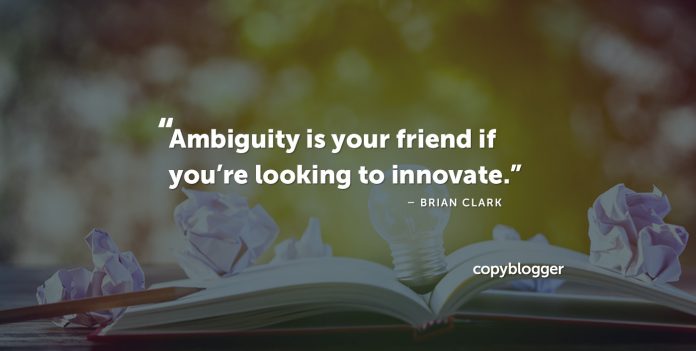Frustrating mental blocks often arise when trying to solve a difficult problem, starting a business, getting attention for that business, or writing an interesting article. But in such situations, creative thinking is crucial.
The process of being successful with content boils down to changing your perspective and seeing things differently than you currently are.
People like to call this “thinking outside the box”, but that’s the wrong view.
Just as Neo had to understand that “there is no spoon” in The Matrix, you need to realize that “there is no box” to step out of.
You create your own imaginary boxes by simply living life and accepting certain things as “real” when they are as illusory as the beliefs of a paranoid delusion.
The difference is that enough people agree that certain man-made concepts are “real” that they are considered “normal”.
Overall, that’s good for society, but it’s that kind of unconditional consensus that hinders your natural creative abilities – no matter how you define creativity.
So instead of looking for ways to inspire creativity, just see the truth.
You are already capable of creative thinking anytime, but you need to remove the imaginary mental blocks (or boxes) that you picked up along the way to where you are today.
What is a mental block?
A mental block prevents you from accessing your natural creative abilities. You will feel like you will never get the job at hand. Instead of feeling inspired and energized, you feel drained.
Finding yourself questioning your decisions is a quick way to realize that you have a mental block. If you weren’t creatively blocked, you would feel confident about your choices and your writing skills. You would write articles quickly.
Mental blocks can prevent you from completing a project – or even prevent you from even getting started.
What causes mental blocks?
A variety of circumstances can cause mental blocks, but mental block usually occurs when you are very concerned about the outcome of a situation.
Think of it this way: if you don’t care about something, there is nothing to worry about, is there? If you don’t have a preference for what a finished project should look like, it’s much easier to flow from task to task and complete each step with a smooth flow.
However, if something is important to you, like the quality of your writing, it’s a lot easier to freeze. When the stakes are high, you are more likely to get blocked.
How to overcome a mental block
I want to keep this list of 10 common ways we stifle our natural creative abilities close by when I’m stuck. It helps me to see that the barriers to a good idea are really all in my head.
1. Trying to find the “right” answer
One of the worst aspects of formal education is focusing on the correct answer to a particular question or problem.
While this approach helps us function in society, it harms creative thinking as the problems of real life are ambiguous. There is often more than one “right” answer, and the second you find might be better than the first.
Many of the following mental blocks can be turned around to reveal ways in which one can find more than one answer to a particular problem.
Try rephrasing the topic in different ways to get different answers and accepting the answers to inherently ambiguous questions in different ways.
2. Logical thinking
Real life is not only ambiguous, it is often illogical to the point of insanity.
While logic-based critical thinking skills are one of our main strengths in evaluating the feasibility of a creative idea, it is often the enemy of truly innovative thought in the first place.
One of the best ways to escape the constraints of your own logical mind is to think metaphorically.
One of the reasons metaphors work so well is because we accept them as true without thinking about it. When you realize that “truth” is often symbolic, you will often find that you are actually free to find alternatives.
3. Follow the rules
One way to see creative thinking is to see it as a destructive force.
You tear away the often arbitrary rules that others have made for you and ask either “why” or “why not” when confronted with the way “all” do things.
This is easier said than done as people often defend the rules they obey even when there is evidence that the rule doesn’t work.
People love to celebrate rebels like Richard Branson, but few seem brave enough to emulate him. Stop worshiping rule breakers and start breaking some rules.
4. Be practical
Like logic, practicality is hugely important when it comes to working as a professional writer, but it often stifles innovative ideas before they can really blossom.
Don’t let the editor in the same room with your inner artist.
Don’t try to evaluate the actual feasibility of any approach until you let it exist on its own for a while.
Spend time asking “what if” as often as possible and just let your imagination run wild. You might discover a crazy idea so incredibly practical that no one has thought of it before.
5. Playing doesn’t work
Perhaps the most effective way to stimulate creative thinking is to allow your mind to play, and yet many people separate play from work.
Nowadays, people with great ideas and solutions are most rewarded economically, while worker bees are often used on behalf of the creative thinkers.
You have heard the phrase “work hard and play hard”. You just have to realize that they are the same as a creative thinker.
6. This is not my job
In an era of hyper-specialization, it is those who happily explore completely disjointed areas of life and knowledge who best see that everything is connected.
This goes back to what advertising man Carl Ally said about creative people – they want to be know-it-alls.
(You can read more about this in the How to Write Remarkably Creative Content article.)
Sure, you have to be familiar with your field, but if you see yourself more as a discoverer than a highly specialized gear in the machine, you run around the technical master in the success department.
7. Be a “serious” person
Most of what keeps us civilized boils down to conformity, consistency, shared values, and yes, thinking about things the same way everyone else does.
There is absolutely nothing wrong with that. But if you can mentally accept that it is really nothing more than groupthink that helps a society function, then you can give yourself permission to turn whatever is accepted on its head and shake off the illusions.
Leaders from Egyptian pharaohs to Chinese emperors and European royalty consulted with fools or court jesters on difficult problems.
The fool’s person allowed the truth to be told without the usual consequences of speaking blasphemy, naivety, or questioning ingrained social conventions.
Give yourself permission to remove this mental block, be a fool and see things for what they really are.
8. Avoidance of ambiguity
We recognize rationally that almost every situation is ambiguous to some extent.
And while dividing complex situations into black and white boxes can lead to disaster, we do it anyway.
It is an innate quality of human psychology to desire certainty, but it is the creative thinker who rejects the false comfort of clarity when it is not really appropriate.
Ambiguity is your friend when you are looking for innovation.
The fact that most people feel uncomfortable exploring uncertainty gives you an advantage as long as you can accept ambiguity instead of running away from it.
9. To be wrong is bad
We hate to be wrong, and yet mistakes often teach us the most.
Thomas Edison was wrong over 1,000 times before getting the lightbulb right. Edison’s greatest strength was that he wasn’t afraid to be wrong.
The best we do is learn from our mistakes, but we have to break free from making mistakes first.
Just try your ideas and see what happens, take what you have learned and try something different.
Are you wondering what’s the worst that can happen if I’m wrong?
You will often find that the benefits of making an error far outweigh the effects.
10. I’m not creative
Denying your creativity is like denying that you are human.
We are all limitlessly creative, but only to the extent that we recognize that we are setting our own limits with our thinking. If you tell yourself that you are not creative, it will come true. Stop this mental block.
In this sense, awakening one’s creativity is similar to the path reported by those seeking spiritual enlightenment.
You are already enlightened, just as you are already creative, but you have to get rid of all of your delusions before you can see them.
Acknowledge that you are naturally creative, and then start breaking down the other barriers that you have created in your head.







